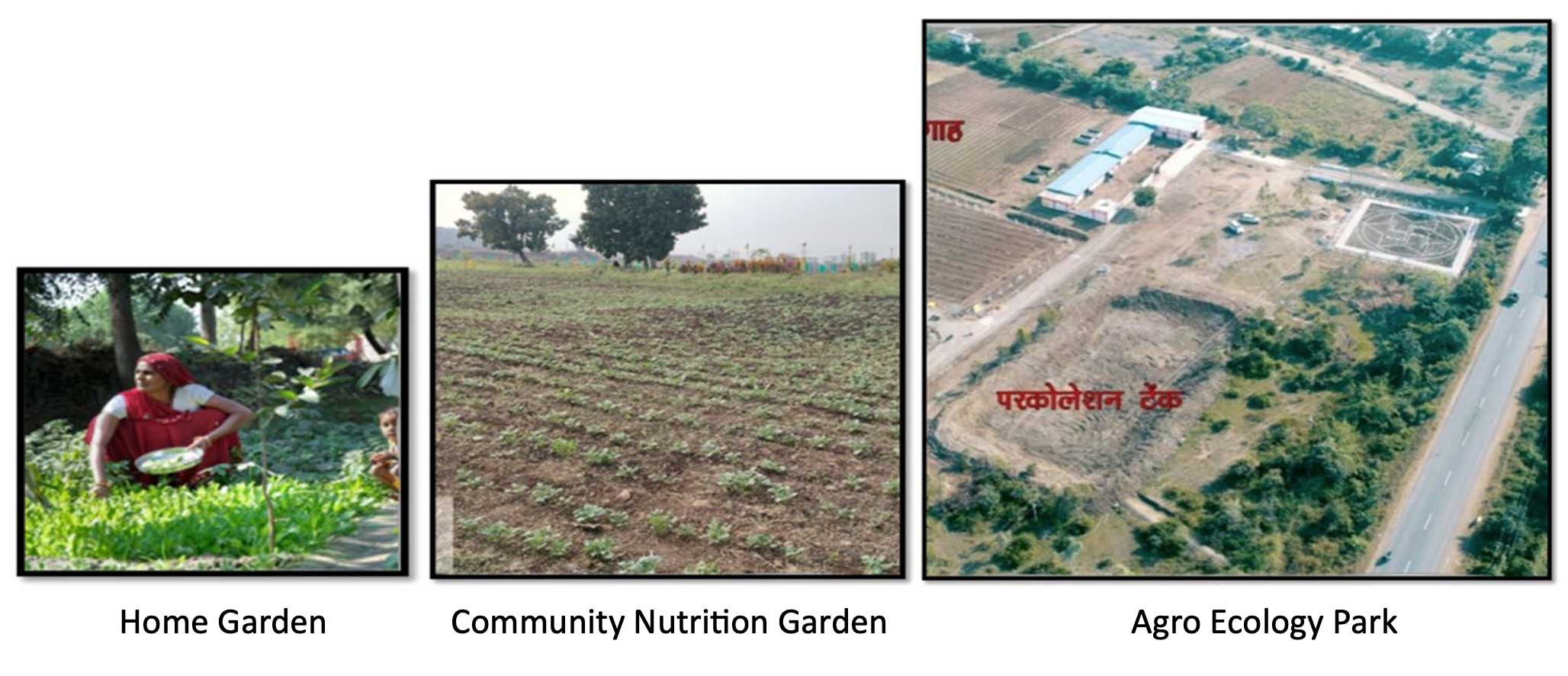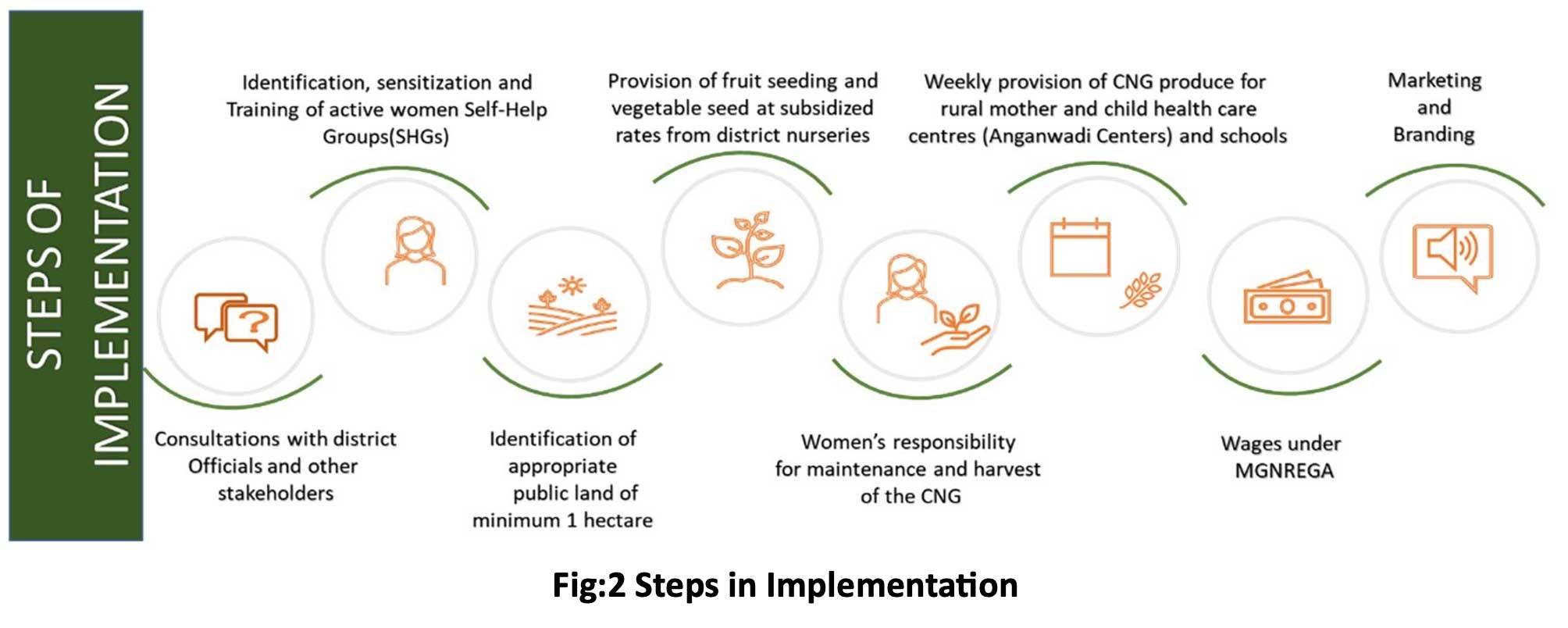Community Nutrition Gardens – An approach towards Agroecological Transformation for Sustainable Food System
The multi-sectoral journey started with piloting twenty CNGs in two districts (Chhatarpur and Sheopur) of Madhya Pradesh since 2019. Under State Rural Livelihood Mission (SRLM)1 structure of the state’s Panchayat and Rural Development department, the CNGs engage landless women from vulnerable communities who are organized in groups called self-help groups (SHGs)2. The SHGs develop and maintain the CNGs.
The multi-sectoral model of CNG is leveraging the funds from Mahatma Gandhi National Rural Employment Guarantee Scheme (MGNREGS) which is one of the world’s largest social protection schemes established under Mahatma Gandhi National Rural Employment Guarantee Act 2005 (MGNREGA)3. Government of India has invested approx. € 10 Billion (INR 89,400 Crore, Apr’22-Mar’23) and it has reached 113.7million rural households [Jan-Dec’22].
In Madhya Pradesh, the nutrition gardens are now implemented in all districts. The reach of the CNGs innovation has traversed beyond 20 gardens and 255 women in pilot phase and mobilized and touched the lives of 8000 women through 600 gardens across the state. [MP Government MIS data].
These agro-ecological farming sites are organized in three models: 1. Homestead Garden 2. Community Nutrition gardens 1 to 2 hectares of land 3. 5-10 hectares as Agro-ecological Park

GIZ’s technical assistance through SENU to the government of Madhya Pradesh has been at the core of this convergence of various departments at the state level: Department of Women and Child Development, Panchayat and Rural Development Department, Department of Agriculture, Department of Horticulture and Food Processing, Department of Fisheries and Department of Animal Husbandry and Dairying.
Madhya Pradesh in India is part of the central highlands of Malwa plateau and Bundelkhand region which is Hot Subhumid to dry ecoregions of India. The red and black soil characteristics of the plateau region covers some districts. The CNG model took into consideration the agro-environmental characteristics of the region and recommended crop rotation & mix, companion planting, agroforestry, Produce and use vermi-compost, Chemical free practices to control pests, Indigenous seeds from community seed banks, Water retention, harvesting and smart irrigation methods, (live) fencing methods to protect crops from livestock in the nutri-gardens.
SENU’s CNG approach is premised on bringing positive environmental, socio-economic, and nutritional health improvement in the lives of the people. When we look at it from an environmental perspective these CNGs are integrated farming sites translating to improved nutritional securities/dietary diversities and socio-economic standards for the community.
At the heart of the multi sectoral approach is the SHG women. Looking through the gender lens, evidence from the social behaviour change communication (SBCC) studies conducted by SENU’s CNG to identify barriers and enablers at community and household levels for understanding nutrition behaviours (2019 and 2021)3 and 4 and dimensions of women empowerment highlighted community and household level barriers (decision making at household level and community/male engagement). GIZ’s technical inputs through the multi- sectoral CNG approach is moving towards gender transformative changes with improvement in as the mobility, agency, household food security, savings, and employment of the SHG women. GIZ’s project specifically focus on the capacity building, SBCC awareness raising programmes, creating safe spaces for dialogues and male/community involvement.
The usufructuary rights over the land and garden also plays an important part in agency and ownership of the SHG women which we can be portrayed through the success story of ‘Ramwati’- 36-year-old housewife. A SHG member. She first learned about SENU’s CNG from the Panchayat. She like most other women from the village would never move out of the four walls of her house and purdah. When she learnt about the CNG and got trained, her life changed. She got involved in the CNG and maintains the nutrition gardens. She shared with us that now she does not have to buy all vegetables for dietary diversity as some vegetables come from CNG, she has a lot of saving and moreover earning from the extra produce of the nutrition gardens which she sells. She also added that she is no more shy to interact with government officials and all this happened because of SENU’s CNG. She is an example the transformation which is just beginning: ‘whosoever has the control of household economy, that person will have the power to decide’.

Moving forward SENU is liaising with MGNREGS in upscaling to 5634 locations (18 CNGs per block). Government has already sanctioned around 4 million euros for 640+ locations acknowledging transformative change in the lives of rural people which embodies agroecology, nutrition, livelihood, and women empowerment.
Contact Person
Dr. Tapan Gope
Key Buzzwords
Multi-sectoral innovation in community led Nutri-gardens

